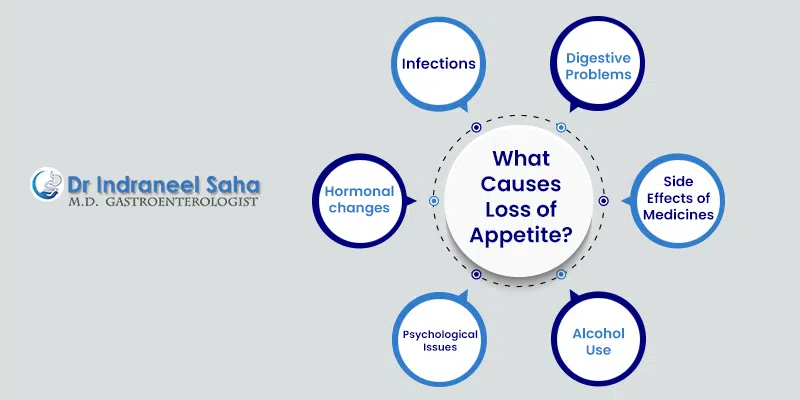- 18th Feb, 2025
- Abdominal Doctor
Experiencing A Sudden Loss Of Appetite? Is It Normal?
Loss of appetite occurs when an individual does not feel hungry or loses the desire to eat. Anyone can experience loss of appetite at some point in their lives. A sudden loss of appetite is a concerning issue, leaving many individuals wondering whether it’s a temporary problem or something more serious.
In medical terms, the condition is known as anorexia. A lot of physical and mental conditions can decrease the urge to eat food. While it’s okay to feel a loss of appetite occasionally, however, when it’s frequent or persistent and accompanied by symptoms like abdominal pain, constipation, nausea and vomiting, it can indicate health concerns.
In this blog, Dr. Indraneel Saha, an abdominal pain specialist, explains the potential causes of appetite loss and when it becomes necessary to seek medical attention.
What Causes Loss Of Appetite?
Take a look below at some of the possible causes of appetite loss.
- Infections: This is probably one of the common causes of loss of hunger. Whenever you fall sick, especially with a common cold, flu, or gastrointestinal issues, the body is busy fighting off infections, which results in nausea, vomitting and reduced hunger. Once you recover, your appetite comes back to normal and you return to eating your food.
- Digestive problems: A decreased interest in eating can also be a sign of disorders in the digestive tract like irritable bowel syndrome, gastritis and inflammatory bowel disease. For those with chronic conditions, it can even be present with issues like abdominal pain, discomfort and cramping.
- Side effects of medicines: There are certain medicines that interfere with the reduced interest in food. For instance, painkillers, antibiotics, or even chemotherapy drugs can reduce the desire to eat as one of their side effects.
- Alcohol use: Heavy consumption of alcohol for a long period can cause a loss in eating. This is because alcohol causes changes in the digestive system, metabolism and nutrient absorption.
- Psychological issues: Health conditions such as depression, anxiety and stress significantly affect the desire of an individual to eat. Most of the time, they don’t feel hungry because of symptoms like sadness, loneliness, or hopelessness.
- Hormonal changes: Disruption in hormonal balance during menopause, pregnancy or menstruation also causes a change in appetite, thereby leading to loss of eating.
Image

When To Seek Medical Attention?
If you are someone experiencing a sudden loss of appetite for some days, make sure not to ignore the situation. Moreover, if you have the following symptoms, it indicates a serious health concern.
- If you are having severe abdominal discomfort or pain.
- If you start to lose weight without any reason.
- There is a constant feeling of weakness and fatigue.
- You find it difficult to swallow foods or drinks.
- If you suffer from signs of fever and chills.
- If you have unexplained changes in bowel movements.
- If you have signs of dehydration such as dry mouth or yellow-coloured urine.
Ways To Manage Sudden Loss Of Appetite
In case you are sure that your lack of eating food is not the result of any serious health issue, here are the things you can incorporate into your eating habits to restore your appetite.
- Eat smaller and more frequent meals throughout the day.
- Engage in light physical activity to stimulate hunger and overall mood.
- Reduce your stress by practising relaxation techniques like mindfulness and meditation.
- Drink plenty of fluid to stay hydrated but avoid sugary or caffeinated drinks.
Wrapping Up
In most cases, a loss of appetite is a short-term condition and usually goes away once the underlying cause is treated. It might happen that the food you used to love indulging in may not excite you anymore. However, if you experience a decreased loss of interest in eating everything continuously for some days, make sure to consult an abdominal pain specialist to begin your diagnosis and treatment without any delay.